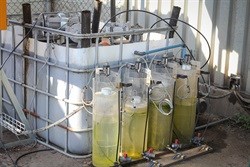
Related

Government fossil fuel subsidies triple under Ramaphosa
Michael Cherry 3 days

Under the South African sun — the economics of sunshine
Rushil Rattan 24 Feb 2026




Top stories






More news














AD is a natural process whereby organic materials are broken down into methane, carbon dioxide and a bio-fertiliser called digestate. During this process, which takes place in a sealed vessel, known as an anaerobic digester, micro-organisms (bacteria) break down biodegradable material in the absence of oxygen, producing biogas and digestate, which have a variety of uses.
"Internationally, this technology is well understood and routinely implemented," says Des Gordon, group CEO of EnviroServ. "Following intensive research, we sought out an experienced international partner to develop a uniquely South African solution."
"With more than 30 years' experience in the field, Waste Works has helped us to develop a range of robust and reliable solutions for the varied streams of organic wastes in Africa. This experienced international project management know-how has been applied by a local implementation team, giving EnviroServ the opportunity to develop individual waste solutions that are consistent and reliable. This is achieved through detailed knowledge of the type and quantity of a client's waste stream."

The demonstration facility, designed and built at the EnviroServ facility located in Bellville, Cape Town, is fully operational and has the capacity to test a wide variety of waste streams, in order to design a product that is tailored to client needs and specific to the type and quantity of source material. As it is located in the middle of a city, the highest safety standards have been subscribed to, and all of the required municipal regulations have been met and registrations have been obtained.
"It is important to emphasise that AD plants are highly sensitive to the types of waste material that they process, and each waste stream has to be carefully analysed and tested before a fit-for-purpose digester can be designed," explains Gordon. "These designs are based on an intimate understanding of the client's unique waste characteristics, utilising a stepped testing process, using micro digesters and our demonstration facility."
He adds that one cannot run the risk of cutting corners by applying a 'one-size-fits-all' approach and then tweaking it for different waste streams; each digester must be individually designed to accommodate a specific type and quantity of waste material, as well as the purpose of the end product.
"These digesters have the potential to significantly reduce the amount of waste that goes to landfill sites across the country and help consumers, farmers and municipalities to regain control of their waste management programmes. We offer win-win-win solutions, in that the AD process reduces the impact of waste on our environment, it lessens our reliance of non-renewable fossil fuels as a source of energy and it produces an organic fertiliser that will maintain the growing potential of our soils," Gordon concludes.